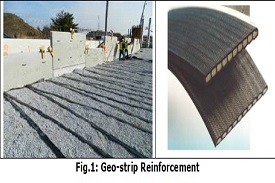
Geostrips, also known as polymeric strips, are crucial parts of soil-reinforced retaining structures. These specialty strips are essential for improving the stability and load-bearing capability of these kinds of constructions. By dispersing lateral stresses and lowering the chance of wall or slope failure, they are intended to increase the soil's overall structural integrity. Even in difficult soil conditions, geostrips allow for the building of higher and more secure retaining walls, embankments, and slopes by enhancing the soil's tensile strength and cohesiveness. In addition to extending the life of retaining structures, the use of polymeric or geostrips in soil reinforcement lowers construction costs and has a less environmental impact.
A number of technical specifications pertaining to the design, manufacture, and functionality of polymeric geostrips are outlined in IS 17372:2020. For geostrips used in soil reinforcement applications, adherence to this standard is legally required. Respecting these set standards aids producers in upholding quality control throughout their manufacturing procedures, which lowers variances in the caliber of their output. Producers that follow these guidelines make sure their goods meet legal requirements, which lowers the possibility of legal problems and liabilities.
Note: The mandatory ISI Mark Certification must be obtained by manufacturers of polymeric strips or geostrips used as soil reinforcement in retaining structures.
Indian Standards Institute, or ISI was renamed the Bureau of Indian Standards (BIS) in 1987. The official mark that the Bureau of Indian Standards provides for manufacturers of various goods is the ISI Mark. It is used to indicate compliance with Indian standards (IS) set by the Bureau of Indian Standards (BIS) and has been used as a conformity marking for industrial products. Manufacturers received permission from BIS to use the ISI Mark on items that comply with relevant Indian requirements through the product certification program.
Only manufacturers (domestic or foreign) who produce the finished product will be awarded ISI Certification. This will not be given to any product importers, traders, dealers, or distributors.
The following documentation is required to get an ISI certification:
For more detailed information, please click here.
There are two approaches for Indian manufacturers to become certified with the ISI Mark:
Regular Procedure
With the possible exception of cases deemed "All India first," which might take up to 180 days, the licensing procedure is expected to be finished in 120 days. This timeline starts on the day the application is received, assuming that at different points in time the documentation, unit assessment, and product conformance are all deemed acceptable.
Step 1: Manufacturing Unit Customization in Compliance with Applicable Indian Standards
Step 2: Submission of the Application Form
For more detailed information, please click here.
Simplified Procedure
This is a much faster process than the standard procedure. After a factory inspection is deemed satisfactory and the initial evaluation establishes that the sample complies with the applicable Indian Standard(s), the license application process is expected to be finished in 30 days.
Step 1: Adapting the Manufacturing Unit to Comply with the Relevant Indian Standard
Step 2: Sample Testing
For more detailed information, please click here
The process of obtaining ISI Mark Certification for Foreign Manufacturers typically includes the following steps:
Step 1: Application
Step 2: Query Raised (If Any)
For more detailed information, please click here.
Brand Liaison provides helpful support for achieving ISI Mark Certification. Among our offerings are:
Please click here to get in contact with our team of specialists for a deeper explanation of the paperwork and steps needed to get ISI Mark Certification.